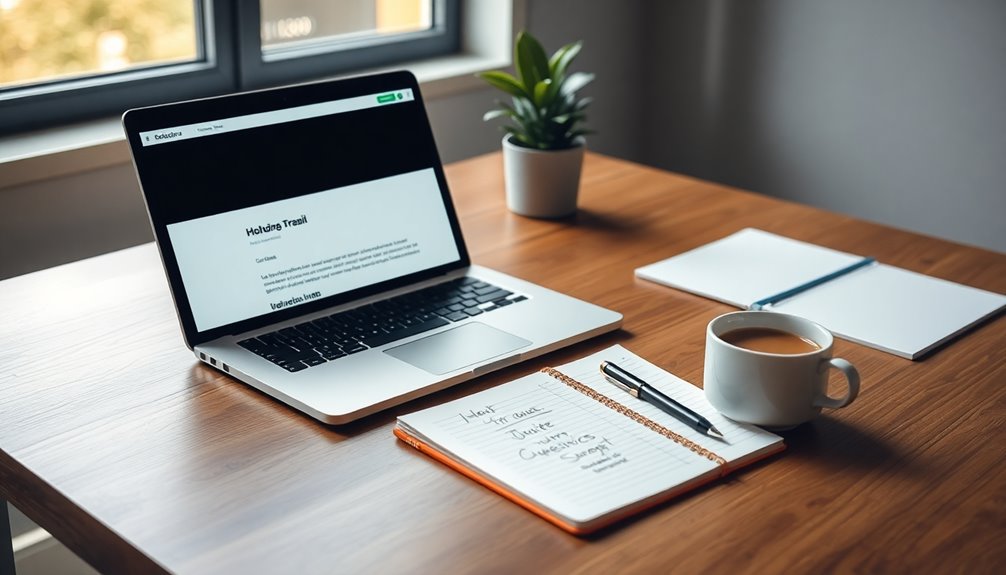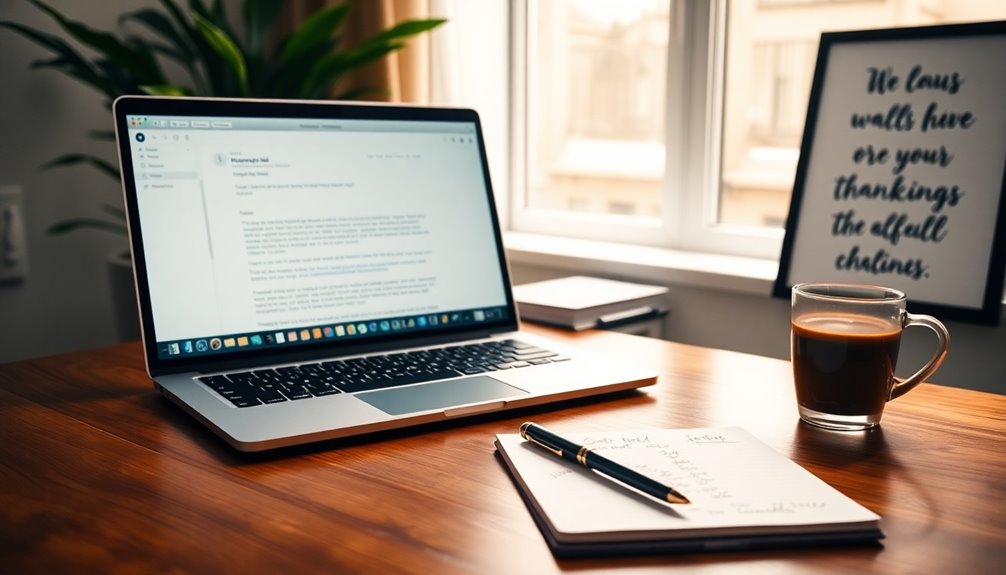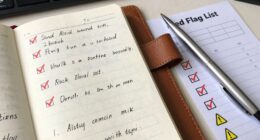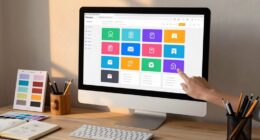To craft an interview follow-up email that gets you noticed, send it within 24-48 hours of your interview. Start with a clear subject line, like "Thank You for the Interview." Express genuine gratitude for the interviewer's time and insights, and reference specific topics discussed during your conversation. Keep it concise—1-2 paragraphs to maintain focus. Highlight your enthusiasm for the role, and consider including a call to action about the hiring process. Proofread for errors, and ensure the tone is professional yet friendly. You'll discover even more effective tips to enhance your follow-up approach!
Key Takeaways
- Send your follow-up email within 24-48 hours to keep your candidacy fresh in the interviewer's mind.
- Personalize your message by referencing specific topics discussed during the interview to demonstrate engagement.
- Express genuine gratitude for the interviewer's time and insights to convey professionalism and respect.
- Keep your email concise, focusing on key messages without overwhelming details, ideally in 1-2 paragraphs.
- Include a call to action, such as inquiring about updates on the hiring process, to encourage further communication.
Introduction

When you finish an interview, sending a follow-up email is crucial to reinforce your interest in the position and demonstrate your professionalism. This email serves as an opportunity to express gratitude for the interviewer's time and to reiterate your enthusiasm for the role. Aim to send your follow-up email within 24-48 hours after the interview to keep your candidacy fresh in the interviewer's mind.
Personalizing the email can create a stronger connection. Reference specific topics discussed during your interview to show you were engaged and attentive. A well-crafted follow-up email can set you apart in a competitive job market, as many candidates overlook this key step.
Make sure your email is concise—stick to 1-2 paragraphs while clearly expressing your gratitude and interest. Use a clear subject line, like "Thank You for the [Job Role] Interview," to ensure your email stands out in the inbox.
This professional tone and approach not only reflect positively on you but also increase your chances of receiving updates on the hiring process. Overall, a thoughtful follow-up email can leave a lasting impression.
Demonstrates Continued Interest

A follow-up email not only expresses gratitude but also demonstrates your continued interest in the position. When you send this professional email within 24-48 hours after your interview, you reinforce your enthusiasm and keep your name fresh in the interviewer's mind.
Start by thanking them for the opportunity and their valuable insights, showing respect for their time and effort in the hiring process.
In your email, express continued interest in the position and mention specific topics discussed during the interview. This approach highlights your engagement and makes your follow-up more personal. You can also reaffirm your qualifications and fit for the role, making it clear that you're excited about the opportunity and believe you're the right match.
Additionally, you might politely inquire about updates on the hiring process or the status of your application. This not only shows your eagerness but also keeps the lines of communication open.
Remember to maintain a polite and professional tone throughout, as this showcases your dedication and helps foster a positive relationship with the employer. A well-crafted follow-up can make you stand out in a competitive job market.
Personalized Thank You Note

Crafting a personalized thank-you note after your interview is essential for leaving a lasting impression. By referencing specific topics discussed during the meeting, you show genuine interest and attentiveness. Mention a key insight the interviewer shared, or highlight something you appreciated about the company culture.
A well-placed compliment about the interviewer can create a positive impression and strengthen your rapport. In your note, don't forget to connect how your skills or experiences align with the role. This approach not only reinforces your candidacy but also reiterates your suitability for the position.
Using the interviewer's name in the greeting adds a personal touch, making your message feel tailored and sincere. Sending your personalized thank-you note within 24 hours of your interview maximizes the chances of being remembered positively. Aim for clarity and conciseness, ensuring that your message stands out. Additionally, consider the importance of open communication in building professional relationships, as it fosters trust and understanding.
Step-by-Step Guide for Follow-Ups

Sending a follow-up email is a vital step after your interview that builds on the personalized thank-you note you've already crafted. Aim to send this follow-up email within 24-48 hours to keep the conversation fresh and show your promptness.
Start with a clear subject line, like "Thank You for the [Job Title] Interview," to convey your email's purpose immediately.
In the body of your email, personalize the email by referencing specific topics discussed during the interview. This demonstrates attentiveness and reinforces your qualifications for the role.
Maintain a concise structure, ideally keeping the email to 1-2 paragraphs. Express gratitude for the opportunity and reiterate your interest in the position. You can also inquire about any updates on the hiring process, which shows your enthusiasm.
Dos and Don'ts for Follow-Up Emails

Navigating the follow-up email after an interview requires a balance of professionalism and warmth. Start by expressing genuine gratitude for the interviewers' time and insights. This reinforces your enthusiasm for the position and shows respect.
In your follow-up email, be sure to reference specific topics discussed during the interview. This demonstrates your attentiveness and engagement, making a memorable impression on the hiring manager. Additionally, highlighting your strong communication skills can further showcase your qualifications and suitability for the role. Just as in agile methodologies, adapting your message based on the interview feedback can improve your chances of making a positive impact. Remember, maintaining a positive mindset throughout the process can also enhance your overall approach. Consider that maintaining emotional alignment can help you to project confidence and positivity in your communication.
While it's essential to remain very interested in the role, avoid using a demanding or desperate tone. A respectful and courteous approach is vital to maintaining professionalism. Keep your email clear and concise, free of errors, to make the best impression possible. Additionally, just as good oral hygiene habits(https://www.example.com) are important for long-term health, maintaining professionalism in your follow-up can positively impact your career prospects.
Limit yourself to one or two follow-ups. Excessive emails can come across as pushy or impatient, which you want to avoid. Remember, the goal is to maintain a positive connection without overwhelming the hiring manager.
Examples of Thank-You Emails

A well-written thank-you email can significantly enhance your chances of making a lasting impression after an interview. Sending a timely email after the interview—preferably within 24-48 hours—can keep you fresh in the interviewer's mind.
Start with a clear subject line like "Thank You for the [Job Role] Interview" to grab attention.
In your personalized email, express my gratitude for the opportunity to interview and mention specific topics discussed. For example, you could say, "I really appreciated our conversation about [specific project or topic]. It reinforced my excitement about the possibility of contributing my skills and experience to your team."
Keep it concise—1-2 paragraphs are ideal. Reiterate your interest in the role and the company, and let them know you're eager to stay in touch.
A simple call to action, like, "Please let me know if you need any more information," can encourage further engagement.
Pro Tips for Writing Effective Emails

Crafting effective follow-up emails can make a significant difference in your job search. After your interview for the [Position], send your follow-up email within 24-48 hours. This keeps your candidacy fresh in the hiring manager's mind and shows your promptness.
Start with a professional subject line, like "Thank You for the [Job Title] Interview," to clearly convey your intent.
In your email, express appreciation for the interviewer's time and insights. This not only reflects professionalism but also reinforces your enthusiasm for the position. Personalize the message by referencing specific topics discussed during the interview. This demonstrates your engagement and reinforces your suitability for the role.
Keep your email concise and focused—ideally, limit it to 1-2 paragraphs. This respects the interviewer's time while still allowing you to convey key messages, such as asking for an update on your application status.
Final Thoughts

In closing, sending a thoughtful follow-up email can significantly boost your chances of making a lasting impression on potential employers. A well-crafted job interview follow-up not only thanks the interviewer, but also reinforces your enthusiasm for the position.
It's your chance to remind them of your insights from our conversation and express that you're still interested in the role.
When writing your follow-up email, thank someone specifically for their time to talk and mention any key points that stood out to you. This personal touch shows you were attentive and engaged.
You can also include a brief recap of why you're confident in your ability to excel in the position, helping them remember why you're a great fit.
If you haven't heard back after two weeks, it's perfectly acceptable to send a follow-up email to stay on their radar. Politely ask for updates on the job and reiterate that you're eager to move forward in the process.
Frequently Asked Questions
How Do You Follow up on an Interview Email That You Are Still Interested?
To follow up on an interview email, send your message within 24-48 hours.
Start by thanking the interviewer for their time and mention specific topics you discussed to show your engagement.
Keep it brief, ideally one to two paragraphs, highlighting your qualifications and enthusiasm for the role.
Don't forget to politely ask about the next steps in the hiring process to demonstrate your ongoing interest.
Maintain a professional tone throughout.
How Do You Send a Polite Follow-Up Email After an Interview?
To send a polite follow-up email after your interview, start by drafting your message within 24-48 hours.
Use a clear subject line like "Thank You for the Interview."
Greet the interviewer by name and express your gratitude for their time.
Mention specific topics from your conversation to show your engagement.
Keep your tone professional and polite, and wrap up with a courteous sign-off, including your contact information for easy reach.
How Do You Follow up on an Email Asking for Interview Results?
When you follow up on an email asking for interview results, wait about one to two weeks after your interview.
Start with a clear subject line like "Follow-up on [Job Title] Interview Results." Thank the interviewer for their time, and express your continued interest in the position.
Politely ask about the status of your application, referencing specific points from your conversation to personalize your message.
End with a courteous sign-off, offering any additional information if needed.
How Do You Politely Ask for an Update After an Interview?
To politely ask for an update after an interview, wait about 1-2 weeks before reaching out.
Start your email with a friendly greeting and express gratitude for the interview opportunity.
Briefly reiterate your interest in the position, then inquire about any updates on the hiring process.
Make sure to offer your assistance if they need additional information to support your candidacy, maintaining a professional tone throughout the email.









